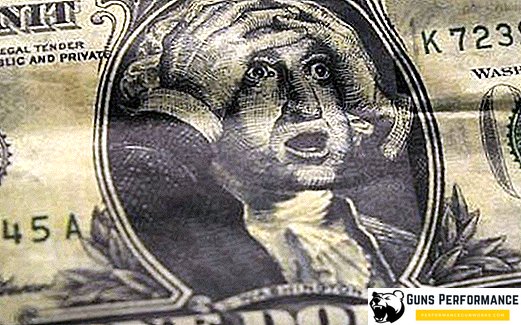
Recently, the Russian authorities have repeatedly declared their desire to get rid of the use of US currency. Given the four years of Western sanctions and the constant expectation of the introduction of new trade restrictions, such a move on the part of the Kremlin is not particularly surprising. Another thing is important: can Russia, having a very modest by world standards of GDP, seriously undermine the financial dictates of the United States.
Challenge the American hegemon: why now?
Over the past decades, the dollar has been playing the role of a major international currency. This state of affairs gives the US economy tremendous advantages, which, naturally, not everyone likes. As far back as 1965, Valery Giscard d'Estaing called the exclusive role of the dollar in international trade "the transcendent privilege." But, despite the constant decline in the American share in the global economy, which has been observed in recent years, the hegemony of the dollar remains unbreakable. Periodically, here and there voices are being heard about the inadmissibility of such a state of affairs, but it is not yet possible to shake the primacy of the "evergreen". As a rule, regimes that consider Washington to be their rival or opponent are the loudest about the “dictate” of the American currency.
After the Crimean events of 2014, several packages of international sanctions were imposed against Russia, and the Americans were (and remain) the main moderators of this process. Currently, the US Senate is considering another package of restrictions, which will be directed against the largest Russian banks. If it comes into force, then the most important financial institutions for the country's economy will simply be cut off from dollar transactions and will not be able to be credited abroad. Earlier, something similar had already been introduced against the enterprises of the military-industrial complex.
Although economic and financial analysts continue to argue about the amount of damage to which Western sanctions have led, there is no doubt that their influence is significant. Therefore, the plan developed by the head of VTB Andrei Kostin found understanding and support both at the Central Bank and at the Ministry of Finance. This document proposes a gradual transition to the use of national currencies in mutual trade.
Another way to de-dollarize the domestic economy is to transfer Russian assets into gold. If in 2008 the reserves of this noble metal were 457 tons, then in 2018 they increased to 1944 tons. Thus, Russia today ranks fifth in the world in terms of gold reserves.
In the fight against the hegemony of the dollar, the Kremlin is actively looking for allies and quite easily finding them: the Russian president recently, together with the leader of China, promised to work together to fight against the decisions of the United States. Earlier, Ankara declared its readiness to partially switch to settlements in national currencies.
Is it possible for Russia to completely abandon the dollar?
Despite certain successes, a significant departure from the dollar in foreign trade is hardly possible for Russia. The basis of our economy remains the sale of oil and gas, and their main customers are in the West. The global oil market uses dollars, and the largest players are unlikely to want to get involved in national currencies.
Commodity markets are generally strongly tied to the US currency. The price of metals, grain and hydrocarbons are formed on the world's major exchanges, in New York, London, Chicago. Calculations for them are carried out mainly in dollars. A country that has switched to a national one when they are sold will inevitably put itself at a disadvantage compared to other suppliers, because buyers will suffer losses due to exchange differences when switching from dollars, for example, to rubles.
In addition, the currencies of developing countries, including Russia, Turkey, Iran, Venezuela, as a rule, are very unstable, which limits their use in international financial transactions. Therefore, it is still possible to convince trading partners to switch to rubles, but it is unlikely to use them as reserves. In order to seriously talk about the convertibility of the ruble, the share of the Russian economy in the world should be increased to at least 5-6%.
At present, there is a tendency of a gradual decrease in the part of the dollar in world settlements: the share of the euro is increasing, the yuan is growing. However, these processes are very slow, they take years and decades.
In Russia, there are often calls for a total dollar ban. But this is definitely a bad idea. An attempt to implement it will inevitably lead to a large-scale disaster. Today, the domestic foreign exchange market by more than 90% is the turnover of the dollar-ruble. The ban on US currency is almost guaranteed to cause hyperinflation and revive the black market with money changers. In addition, any restrictions in this area will lead to a decrease in foreign investment: why should foreign companies invest in an economy where you can only earn rubles?
In conclusion, it remains to add that the hypothetical refusal of Russia from the dollar is unlikely to cause the United States significant damage - our GDP is too small. To have a really serious weight in the modern world, it is necessary to have a strong and developed economy.












